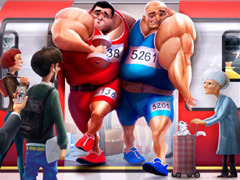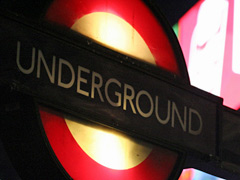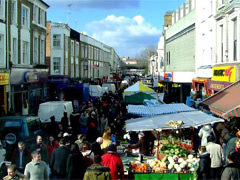


If you’re staying in London while the Olympic Games are on but want to avoid the hubbub, you could always do a gargantuan shopping trip before the 27th of July and stay at home for the duration, acquainting yourself with the sofa. Alternatively read our guide to surviving the Games.
Transport
In terms of getting around while the Olympic Games are on, unsurprisingly the tube is the main concern. It is estimated that on the busiest days the tube will carry 4.5 million passengers; the average is 3.9 million, which as all commuters know, is bad enough at peak times. Certain zone 1 stations on the Central, Metropolitan, Hammersmith & City, Circle and Jubilee lines (labelled “hotspots” by Transport for London) will be impacted the most, so it’s a good idea to avoid these if possible by taking different routes, and allow between half an hour and one hour extra travelling time. If in doubt, consult the TfL website. Wi-Fi will be enabled at all central London underground stations, so if you carry a smartphone or an iPad you’ll be able to quickly find out how to get around a delay, see if any stations are closed, if there are escalator problems, etc.
The revamped London Overground connects Stratford to West Brompton for Earl’s Court, and Wembley Central for the stadium, so the line will be very busy and these stations are best avoided.
National Rail won’t be hit quite as badly as the underground, with the exception of large stations like Waterloo and London Bridge - all major interchanges with the Jubilee line will be extremely crowded. If you live close to a rail station, see whether you can travel to somewhere that’s within walking/cycling distance to your destination. Who knows, the weather may even allow for a pleasant stroll in the sun on your way to work.
Buses will run more frequently, making this another good alternative to the tube, however there will be diversions for certain events, and the added traffic means you should still allow extra time for your journey. If you’re driving, check for temporary road closures first. No non-emergency road works will be taking place during the Olympics.
\n\nNew docking stations for Boris bikes have been installed, with 7,000 spaces at the Olympic Park alone, but it’s safe to say that wherever you are in inner London there is likely to be a Boris bike in the vicinity. If your journey is under 30 minutes use of the bike is free.
There is always river transport, which will undoubtedly provide the most scenic journey, but it’s only useful if you live and work near the Thames. It’s still worth looking into however, as to get into the West End you could travel to Festival Pier by Waterloo, and walk into town in 15 minutes, avoiding crowded stations.
On the plus side (yes, there is one), the tube and DLR will be running one hour later in the evenings, with the last trains leaving central London at 1.30.
Avoid the rush hour
It’s easier said than done, but try to avoid travelling during the rush hour (7:00 to 9:30 and 16:00 to 19:30) if you can. Some London businesses are letting staff work from home for the Olympic fortnight, so if you have access to a laptop it’s worth asking whether you can do your job at home.
If that isn’t possible, find out if you can change your hours. Some companies have flexible working schemes which allow you to come in later or earlier, ask your line manager or HR department.
\n\nOther considerations
It’s no secret that opportunistic hotel owners and landlords are taking advantage of the Games to push prices up. But what about other costs?
Earlier this year TfL rejected a proposal to increase the fare of black cabs by 22%, so at least that won’t change. What it does mean however, is that an estimated 40% of cab drivers will be on holiday for the duration of the Games, so hailing a taxi might be as complicated as finding a seat on the tube.
We like TfL’s suggestion of popping to the pub after work to avoid peak traffic times, and they’re even encouraging the hospitality industry to offer special deals to encourage people to stay out later. So far Madame Tussauds, The Sanctuary Spa and a number of West End theatres have signed up, with things like late night visits and after work theatre tickets for £10. The full list of participating companies and their offers will be announced in June.
Far from the madding crowd
With the increase in visitors to the capital it stands to reason that popular tourist spots are going to be busier than ever. You can expect lengthy queues and much neck craning if you visit the Science Museum on a Saturday afternoon while the Games are on. Plan your excursions so that they’re early in the morning or late in the evening if possible – most museums open late one night per week, usually till 22:00.
As the busiest hotspots will be in zone 1, consider spending time in parts of London that will be less affected. Areas like Notting Hill, Primrose Hill, Hampstead, Clapham and Brixton will be calmer, and have plenty to offer in terms of bars, restaurants, cinemas and green spaces.


